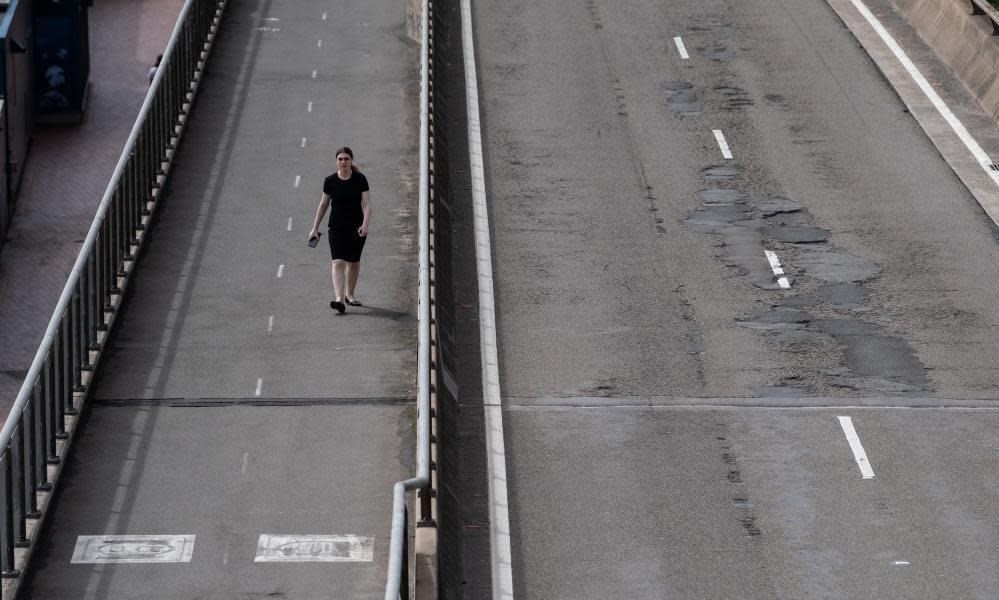Parents with their children, home haircuts and no affairs: the virus has forced us to live in a weirdly moralistic way

Imagine if you just got out of a silent 40-day retreat without wifi and returned to society not knowing about the virus. What would you think had happened?
My first thought would be that a plain people religious group (think Quaker, Mennonites or Amish) had become our new rulers.
These groups live simply, home school their children, dress plainly, have a strict moral code, make their own furniture, sport home haircuts and don’t travel far from their communities.
Just look at how we have changed how we live. In only a week!
Schools are closed and children are being homeschooled – not in groups or centres outside the home, but literally schooled at home. By their parents! Parents or carers who only recently set off for work each day and dropped their children at daycare centres or in school are now spending every minute of every day with their children!
All your friends interstate and overseas have cancelled plans to visit.
The jet set and global citizens have been grounded, either quarantined with bad food in previously luxurious hotels or forced to stay at home and retreat into neighbourhood and family groups.
Related: Overload in a time of coronavirus | Brigid Delaney
A kind of goodwill and old-fashioned values of thrift, kindness and charity are emerging. Bartering is back. In your letterbox are flyers from your actual neighbours. They are introducing themselves and offering to do your food shopping or pick up prescriptions for you. Community libraries are being set up in boxes along suburban streets. There are signs offering seedlings in exchange for cuttings. All along your road your neighbours are planting vegetables.
In the sky there are few planes and hardly any cars on the road. Trains and buses are almost empty – and if you try to sit next to someone, people look really scared and angry and move seats.
In the tradition of plain dressed religious groups, people’s hair has also changed. Everyone looks as if they cut their hair at home into bowl cuts, with blunt scissors. Those with coloured hair have stopped maintaining it. They have grey temples, white streaks or skunk stripes down their parts. Men are growing long beards.
It’s not just the haircuts – it’s the faces.
People, particularly in the more affluent areas, look different: more wrinkled, their faces slacker and less filled out. It’s as if this new sect banned Botox and fillers.
Then there are the clothes. In the supermarket queue (hey, did this new sect ban toilet paper and pasta because there’s like none on the shelves?) people stand spaced far apart, looking morose. Everyone is dressed in stained tracksuits, baggy-arsed yoga pants or bedtime wear. Their faces are doughy and pale, their bodies heavier as if they were eating a lot. No one bothers with makeup anymore or perfume. Many people seemed to be either medicated or hungover.
The person coming out of the silent retreat might also presume that the sect that’s taken over society has a strict moral code (as well as an appalling dress code).
Adulterous affairs the world over have suddenly stopped. All the cover is gone, and suddenly you can’t pretend you’re meeting your colleagues for an after-work drink while you’re actually shagging your bit on the side.
Even if you could have an affair, there’s nowhere to have it. The hotels have turned into quarantine stations and illicit couples concerned about being busted via contact tracing (which happened to Gwyneth Paltrow’s character in Contagion) have put their affairs on ice.
Related: We crossed over this week: coronavirus is heaping cruelty upon cruelty | Brigid Delaney
Say you’re not having an affair, but you feel like a bit of casual sex or at least a snog. You could go to a bar but they are all shut, so you go on the apps and try to hook up but no one is keen to meet anyone, anywhere, anytime in the next six months.
Even your friends have become strangely conservative. Checking your Instagram feed, there’s loads of inspirational quotes, videos of people making sourdough bread, others of people planting herb gardens. No one seems to be going out. You feel an absence of Fomo.
And the government itself has radically and rapidly pivoted – from free-market, neoliberal, conservatives to socialists.
Under a conservative government, unemployment benefits have doubled. There’s money for Australians who’ve been stood down from their jobs. Scott Morrison is asking landlords not to evict tenants who can’t pay rent. The banks are giving struggling businesses a break from their loans.
We knew such a widespread pandemic had the capacity to reshape society – but nobody suspected it would quite look like this.
Brigid Delaney is a Guardian Australia columnist


